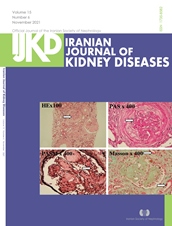Anti-Compliment Factor H Antibody Associated Hemolytic Uremic Syndrome in Children with Abbreviated Plasma Exchanges: A 12-Month Follow-up Study
Abstract
Introduction. Anti-Compliment Factor H antibody hemolytic uremic syndrome (AFH-HUS) is a common cause of paediatric atypical HUS in India. We wanted to study the outcome of patients receiving less than recommended plasma exchange (PLEX) but adequate immunosuppression, with respect to hypertension, preservation of renal function and proteinuria. Methods. A retrospective study was performed in 15 children admitted from 2016 to 2018 with AFH-HUS. Follow up details including physical examination, hematological parameters, renal function test and urine examination performed at 3, 6, and 12 months were noted. Risk stratification and staging for chronic kidney disease (CKD) were done according to the Kidney Disease Improving Global Outcomes (KDOQI) guidelines. Standard statistical tests which were appropriate were used. Results. Mean age of our study cohort was 7.8 ± 1.9 years. 14 children had hypertension. Mean nadir hemoglobin was 5.8 ± 1.0 g/dL and platelet = 58 ± 37.7 × 109 cells/L. Median anti factor H (AFH) level was 316 AU/mL (150 to 452). Hemodialysis was required in 7 children. Fourteen children received PLEX with a mean of 11 ± 6 cycles. Thirteen children received 6 cycles of intravenous cyclophosphamide. After six months, therapy was switched to mycophenolate mofetil in 4 children, steroids alone in 2 children and 9 children with azathioprine. On follow-up, risk of CKD reduced from 80% at 3 months to 26% at 12 months (P = .01). Only 40% patients had CKD stage 2 at the end of 12 months (mean eGFR = 95.0 ± 19.4 mL/min/1.73m2). Conclusion. The adequate number of PLEX needed in AFH-HUS needs further studies. Till such reports come, PLEX in recommended strategies or lesser, if not available, with immunosuppression in AFH-HUS can decrease progression to CKD.
DOI: 10.52547/ijkd.6507
Downloads
Download data is not yet available.
Downloads
Published
2021-12-20
Issue
Section
ORIGINAL | Kidney Diseases
How to Cite
Anti-Compliment Factor H Antibody Associated Hemolytic Uremic Syndrome in Children with Abbreviated Plasma Exchanges: A 12-Month Follow-up Study. (2021). Iranian Journal of Kidney Diseases, 15(6), 419-425. https://www.ijkd.org/index.php/ijkd/article/view/6507





